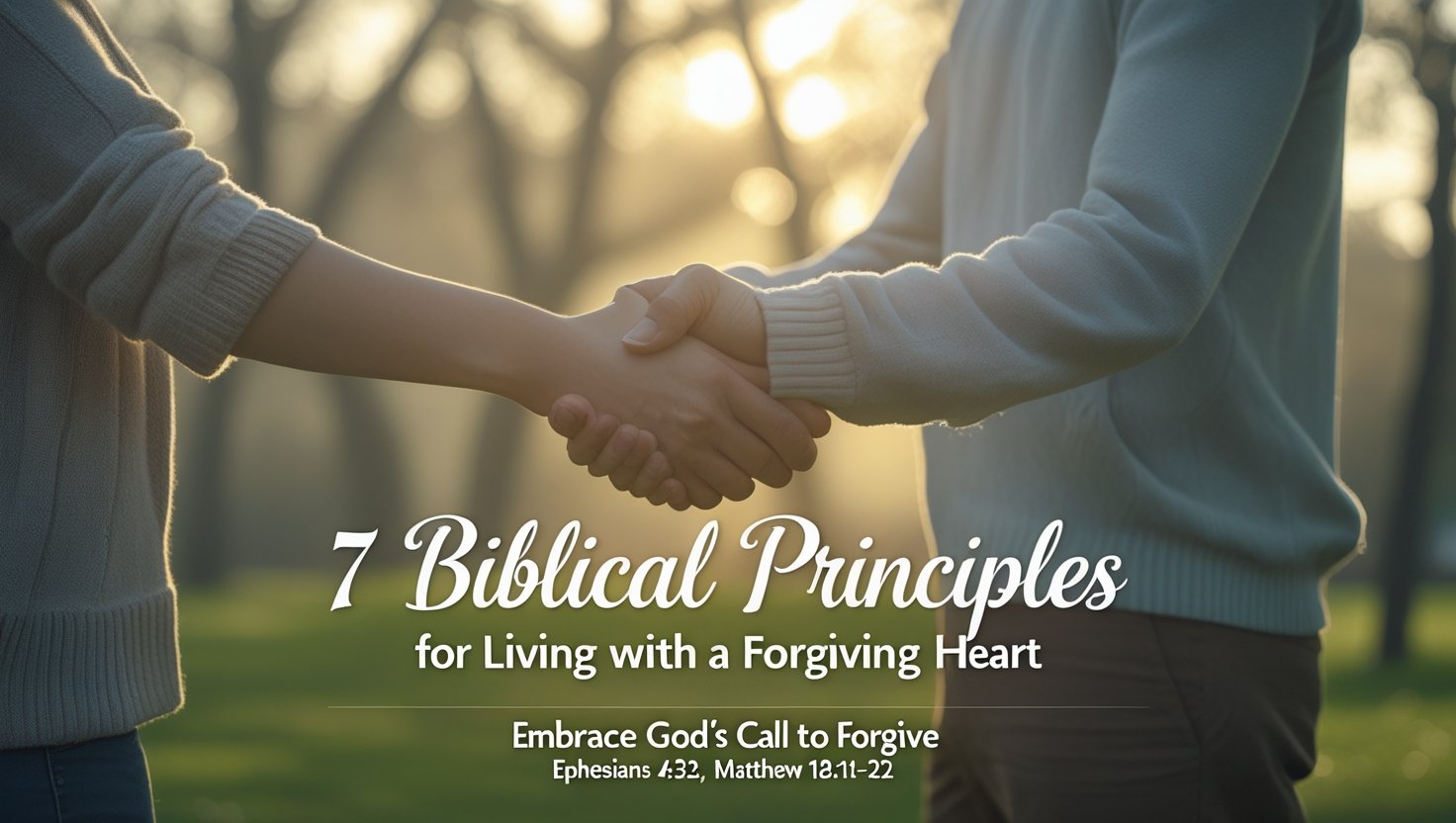Discover how “7 Biblical Principles For Living With A Forgiving Heart” can transform your life by nurturing a forgiving heart, fostering deeper relationships, and finding inner peace.
7 Biblical Principles for Living with a Forgiving Heart
Embarking on a journey to cultivate a forgiving heart is not just about quoting Scripture; it’s about embodying the teachings that have echoed through time and addressing the deep, touchy spots in our hearts where grudges like to build their little homes. You might think forgiveness is a Herculean task, reserved only for the saints. But here’s the truth: it’s woven into the fabric of our human experience and is accessible to each one of us. Let’s dive into seven transformative biblical principles that can guide you to a life brimming with forgiveness.
1. Understand the Power of Divine Forgiveness
Before delving into the realm of personal forgiveness, it’s essential to grasp the gravity of divine forgiveness. The feeling of being forgiven, especially by a higher power, is like being drenched in warm sunlight after a bleak, cloudy day. The Bible presents a compelling picture of this in 1 John 1:9: “If we confess our sins, he is faithful and just and will forgive us our sins and purify us from all unrighteousness.”
This concept isn’t about a transactional exercise of voicing our wrongs for some divine brownie points, but rather an invitation to reconciliation with the Almighty. Understanding this can help you let go of guilt for your mistakes, which is often the first step in cultivating forgiveness towards others. You begin to internalize that forgiveness, granted freely to you, is a powerful force that can pave a path towards inner peace.
2. Practice Empathy as Jesus Did
Having a forgiving heart sharply tunes your ability to empathize with those around you. When you’re in the thick of anger or resentment, it’s challenging to see beyond your pain. Jesus’ life continually echoed empathy, even during the crucifixion, as noted in Luke 23:34: “Jesus said, ‘Father, forgive them, for they do not know what they are doing.'”
Practicing empathy doesn’t mean invalidating the hurt you feel but rather recognizing the humanity in others, their struggles, and their imperfections. When you begin to view every situation from a perspective other than your own, your deep-seated grudges start to lose their foothold. Empathy allows you to walk in someone else’s shoes, to see the grey areas in the black and white notions of right and wrong, making the act of forgiveness a natural choice rather than an enforced duty.
3. Let Go of Judgments
Forgiveness and judgment are two incompatible roommates. To foster a forgiving heart, you need to unclench your tightly held judgments. The Bible speaks about the futility of judgment and its ability to cloud one’s heart and mind. In Matthew 7:1-2, it is written: “Do not judge, or you too will be judged. For in the same way you judge others, you will be judged, and with the measure you use, it will be measured to you.”
Releasing judgment doesn’t mean giving a free pass to wrongdoings or compromising your values. Instead, it’s about releasing the burden of deciding someone’s worth based on their actions alone. When you let go of judgment, you foster a space where understanding and compassion can thrive. And in that space, forgiveness often swoops in as the most appropriate and healing response.
4. Remember the Limitless Nature of Grace
Grace is like the air of the forgiving heart; without it, the heart cannot breathe. Embracing grace enables forgiveness to flourish. Often, we think our ability to forgive is a finite resource to be dispensed sparingly, but in Ephesians 2:8-9, grace is shown as limitless: “For it is by grace you have been saved, through faith—and this is not from yourselves, it is the gift of God—not by works, so that no one can boast.”
Acknowledging grace in your life extends forgiveness beyond what seems reasonable or possible. When you comprehend grace’s boundless nature, you allow it to flow freely through your life, cleansing old wounds and fostering reconciliation in relationships. Knowing that you possess an abundance of grace makes you more willing to forgive offenses without keeping a mental scorecard.
5. Seek Reconciliation, Not Retaliation
Retaliation might feel satisfying in the short term, but it ultimately leaves a mark on your heart, holding you captive in a cycle of resentment. The Bible advocates for seeking peace and reconciliation tirelessly. Consider Romans 12:18: “If it is possible, as far as it depends on you, live at peace with everyone.”
Reconciliation doesn’t imply returning to toxic situations or relationships but rather finding closure and peace. It’s an internal resolution more than an external one. When you’re focused on reconciliation, you pivot from harboring grudges to seeking solutions. It’s about healing your heart so that you’re no longer shackled by the bitterness of past grievances. This shift from retaliation to reconciliation transforms anger into understanding, creating fertile soil for a forgiving heart.
6. Lean on Prayer and Reflection
Prayer is your hotline to divine guidance when the road to forgiveness seems insurmountable. Through prayer and reflection, you allow yourself a moment to pause, surrender your pain, and invite peace into your heart. Philippians 4:6-7 encourages this practice: “Do not be anxious about anything, but in every situation, by prayer and petition, with thanksgiving, present your requests to God. And the peace of God, which transcends all understanding, will guard your hearts and your minds in Christ Jesus.”
There’s a transformative power in articulating your struggles in prayer, a space to receive grace and align your heart with divine forgiveness. Additionally, reflection allows you to assess relationships, understand your triggers, and identify the roots of your resentment. Taking this sacred time helps ground you, making forgiveness less of a challenge and more of a path to freedom.
7. Embrace Love as Your Guiding Principle
At the heart of a forgiving nature lies an all-encompassing love. It’s the love that mirrors the love shown to us by God and encourages us to mirror that love to others. 1 Corinthians 13:4-7 paints a beautiful portrait of this love: “Love is patient, love is kind. It does not envy, it does not boast, it is not proud. It does not dishonor others, it is not self-seeking, it is not easily angered, it keeps no record of wrongs. Love does not delight in evil but rejoices with the truth. It always protects, always trusts, always hopes, always perseveres.”
When you allow love to lead, it becomes the primary force that guides your actions and decisions, overshadowing the urge to hold grudges. Love reminds you that forgiveness isn’t about forsaking justice; it’s about choosing a path that leads to healing and peace. Embracing love doesn’t mean ignoring pain or wrongdoing; it means committing to a purposeful journey towards wholeness.
Living with a forgiving heart is a transformative experience that not only shapes your spiritual journey but fosters more profound, healthier relationships with others. As you adopt these biblical principles, you’ll discover that forgiveness isn’t just an act but a way of life. I invite you to reflect on these teachings, engage with them, and see how they unfold in your life.

Explore More Bible Insights:
✅ 1. Serving God by Serving Others
Tone: Practical, inspirational, servant-hearted
🔹 “Live Out Your Faith with These Reads”
✅ 2. The Prayer of Jabez – 1 Chronicles 4:10
Tone: Encouraging, bold faith, personal growth
🔹 “Ask Boldly, Live Fully – Keep Reading”
✅ 3. The Promise of Eternal Life – 1 John 2:25
Tone: Reassuring, hope-filled, theological
🔹 “Secure in Christ – Explore More”
✅ 4. Lessons from the Battle of Jericho – Joshua 6
Tone: Obedience, victory through faith, historical insight
🔹 “Victory Through Faith – Read Next”
As a ClickBank Affiliate, I earn from qualifying purchases.
Acknowledgment: All Bible verses referenced in this article were accessed via Bible Gateway (or Bible Hub).
“Want to explore more? Check out our latest post on Why Jesus? and discover the life-changing truth of the Gospel!”








